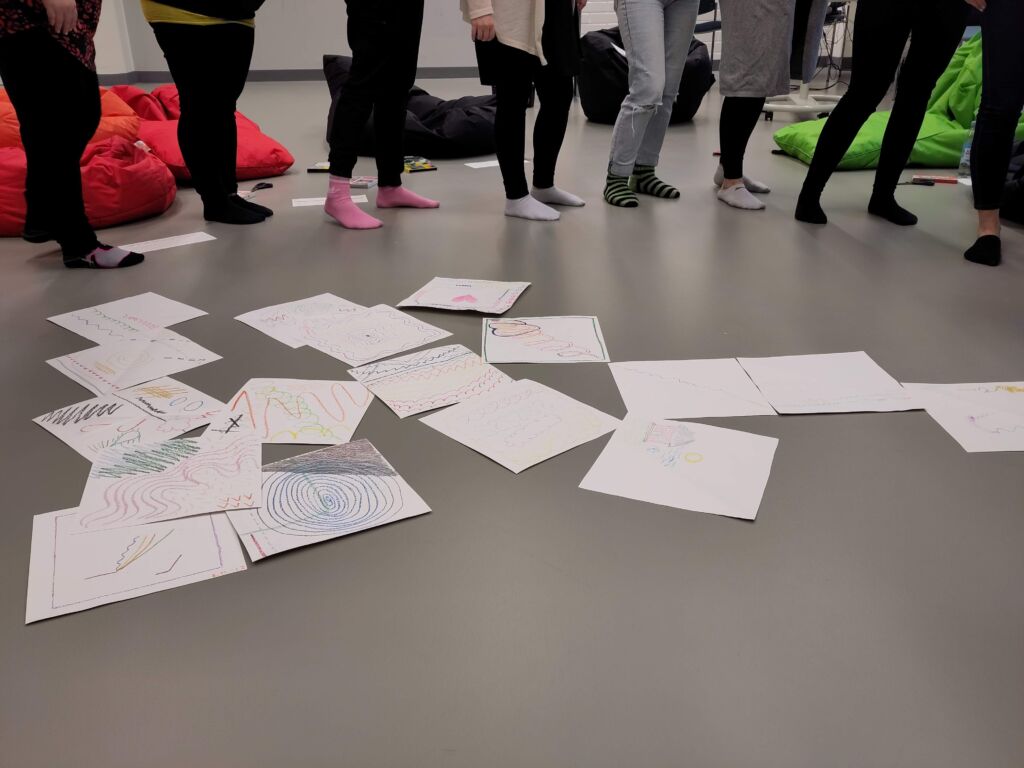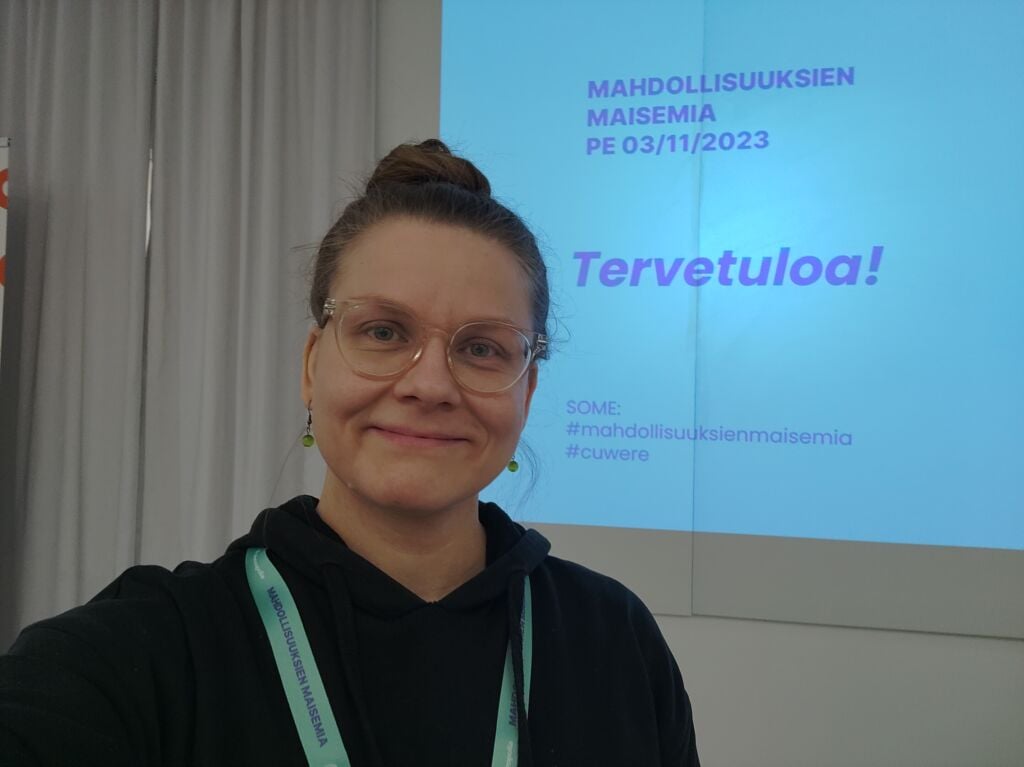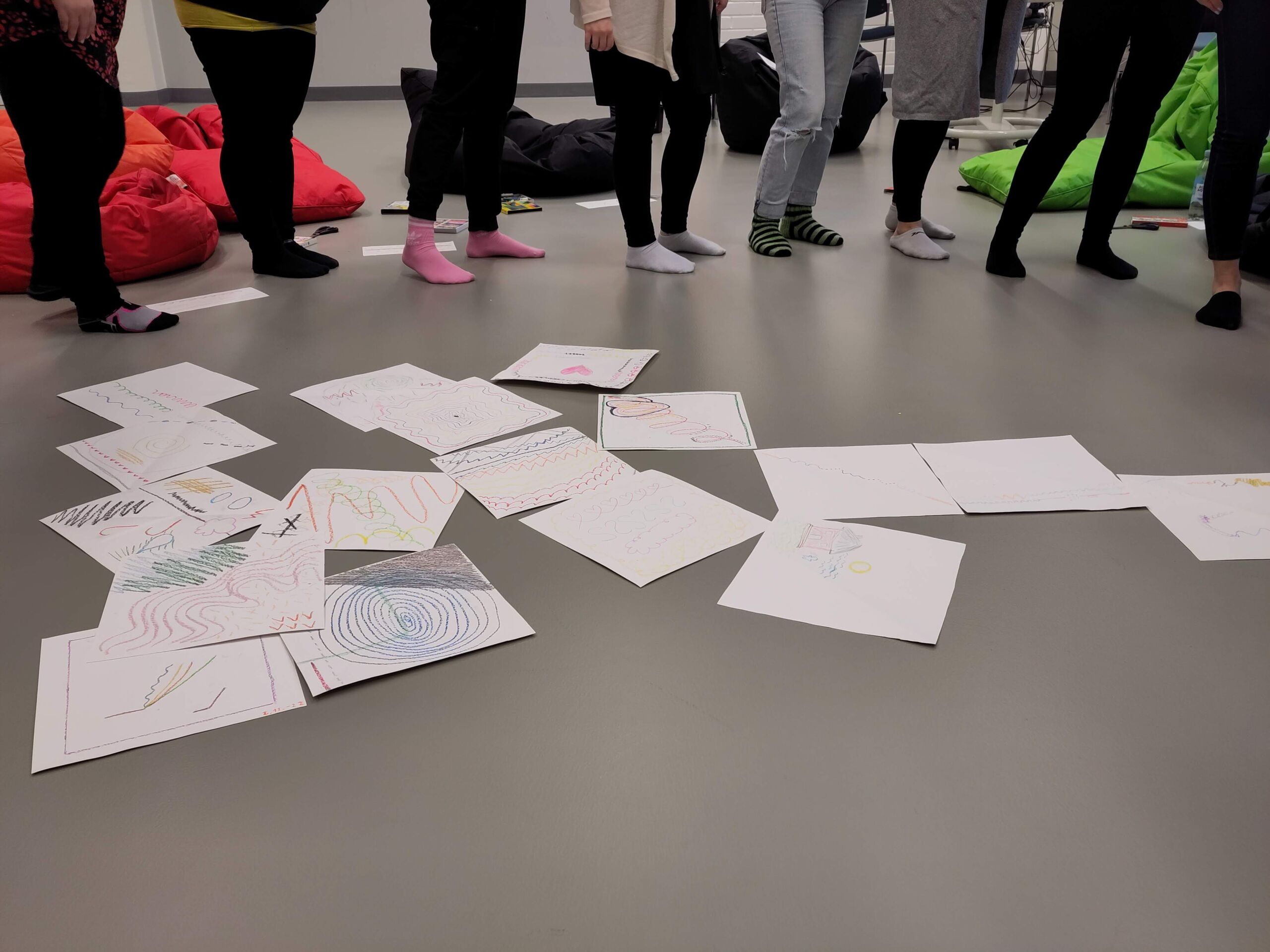In this article, I discuss my professional identity as a part-time teacher in Karelia UAS. In addition to teaching, I work at the interface of social and art sectors, and with theatre and events, to mention a few. I am also studying for a master’s degree. Part-time teaching can be an interesting addition to a career, but it can be demanding to pick up the necessary information and join the UAS community with limited working hours.
By sharing my story, I hope to promote three things:
- to encourage professionals in different fields to consider part-time teaching as one of their careers,
- to offer peer support to other part-time teachers,
- to give ideas to UAS communities for attracting and supporting new and existing part-time teachers.
Part-time Teacher as a Representative of Work Life
Interaction between education and work life is built in several ways in Karelia. One of the means is recruiting experts from the Expert Pool (Osaajapooli) to develop the studies (Karelia 2024, Karelia 2023a). It has also been my path – first to occasional career visits, and from autumn 2021, to part-time teaching and developing new courses in Karelia’s social services study programme.
I do not have formal teacher education which sometimes feels as a shortcoming. However, I have strong practical and theoretical experience on the subjects I educate on, and I am a professional in leading groups, performing and shaping pedagogical processes in the contexts of drama, communities and social work. Leaning on these skills I have dared to take the leap to teaching in a higher institution. Also, in general, university of applied sciences (UAS) teachers have diverse professional backgrounds, and they build their teacher identities using various sources (Marttila 2015, 39–43). Competence of their own field and pedagogical skills are in the core of the teachers’ expertise, added with the ability to apply research (Parkkonen & Nuutinen 2020; Marttila 2015, 34–36).
Alongside teaching, I work elsewhere on the same subjects as what I teach – such as community work and cultural wellbeing. Therefore, when teaching in Karelia, I am not merely a teacher but also a representative of work life outside the UAS. The students have taken the advantage of it, asking about, for example, what is multi-professional collaboration in practice like and how much it is actually possible to apply creative and art-based approaches in social work. Telling practical and topical experiences seems to interest my future colleagues and it also gives me an opportunity to reflect and verbalise the things I have done.
Teacher as a Learner
According to Karelia’s Work Community Development Plan and Career Development Plan, 70 % of employee’s learning takes place through work tasks (Karelia 2024, Karelia 2023b). To me, teaching is learning to a great extent, and the possibility to learn gives motivation to the work (see Hongisto-Peltomaa 2023, 52). A new teacher, even part-time, has to learn the data systems, the curricula, students’ absence policy and all the rest from scratch. And that can be hard, because you may not know many colleagues when you start. My closest colleagues have helped me through a lot of practicalities, but I have to admit that my information-seeking skills and courage to ask questions have been tested over these past few years! (See Karelia 2024, Karelia 2023b.)
Probably most rewarding is the interaction with the students. I let them know that our discussions on the lessons and reviewing their course assignments make me perceive new things and I look forward to those. In the future, I would like to build more of a professional social work community where students would consider themselves as junior colleagues who contribute to the development of the field and look to the direction of cross-sectoral work (see Marttila 2015, 52).
In addition to learning on the job, I am reaching out to new understanding, networks and career opportunities by studying. When writing this, I am in the final stages of my master’s degree studies in Creativity and Arts in Social and Health Fields (CRASH) programme in Metropolia UAS. I like to mention to my Karelia students that I am a student, too. I think it creates something shared between us as well as it is an expression of continuous learning.
Being a student myself and doing a master’s thesis research have definitely offered another layer to my professional identity and work practice as a teacher (as well as in other jobs). It is motivating to bring some of the latest news from the master’s studies to my own teaching. Also, teachers are expected to be up to date in the subjects they teach which requires following the progress and discussions in their field (see e.g. Hongisto-Peltomaa 2023, 108; Marttila 2015, 46). I believe that completing studies and doing research are some of the most intense ways to keep yourself at the heart of your profession. It is hard work too, which is why it has been particularly important to get encouragement from my superior and colleagues in Karelia. One of the challenges is, how to find the time to process the new information and integrate it as a part of your teaching contents, approaches and materials (see Hongisto-Peltomaa 2023, 108; Manner 2019).

Part-time Teacher as an Agent
Being a member of several work, study and volunteering communities at the same time is a great form of social capital. It is also the way I build my financial income, and simply the way of life for me. I find it very meaningful to be active on the same topics and goals, such as cultural rights, cultural wellbeing and strengthening communities, in different positions. I also think it is not valuable solely for me. I feel like an agent who can transmit information between organisations, networks and contexts.
In Karelia, my fragmented employee profile has been received with understanding and it is even seen as an advantage. It is the same case in my other jobs, studies and networks. I have sometimes been called “a shuttle” which crosses between different environments. The downside is that networking and creating connections are often not sufficiently resourced to part-time jobs inside or outside the UAS. What can be done voluntarily is limited. I hope that someday “a shuttle” could be a recognized position and I could bring more value to different organisations and purposes. In networking, getting to know other people is a key element. As a part-time teacher it is not self-evident that you have met many of your colleagues in the same study programme – you may not even know their names.
Part-time Teachers as a Resource
For this text, I read several articles and book chapters about teacher’s identities, motivations for teaching as a job and additional training for teachers. Most of them are not included in the reference list because they relied on, quite old-fashioned if I may say, teaching as a full-time job and teaching as a person’s primary professional identity. To me, these are not things I could relate to. I believe UASes human resources management also recognizes that the forms of working are more diverse, and they include, e.g., part-time teachers, mentors and visiting speakers.
Still, I feel that Karelia’s internal development plans could pay more attention to part-time teaching as a career and as a way of belonging to the work community. In my perspective, it is a potential path to full-time positions in UASes as well as to deeper collaboration – such as local or international development projects – between UASes and local businesses or non-governmental organisations. Universities of applied sciences are obligated to work on regional development and to cooperate with different stakeholders (Universities of Applied Sciences Act 932/2014, 4§, 6§). Investing in part-time teachers (and other experts who share their time with education and other work life) can even be seen as a way to fulfil these tasks defined by the law.

Author:
Maria Korkatti, Cultural Wellbeing Messenger (kulttuurihyvinvointilähetti), CEO, OSK Pohjois-Karjalan kansanteatteri & Part-time teacher, Karelia UAS
This article has been written as a part of my master’s degree studies for Metropolia UAS.
References
Hongisto-Peltomaa, Saija. 2023. Hehku ja hiipuminen, vimma ja vitutus. Motivaatio ja innostus opettajuudessa. Opintoverkko Oy.
Karelia 2023a. Osaajapooli (Expert Pool). Retrieved from https://www.karelia.fi/karelia-ammattikorkeakoulun-osaajapooli/ Read on Nov. 11, 2023.
Karelia 2023b. Karelian työuraohjelma (Karelia Career Development Plan). Available in Karelia intra for staff members. Accepted Jan. 18, 2023. Read on Mar. 2, 2023.
Karelia 2024. Työyhteisön kehittämissuunnitelma (Work Community Development Plan). Available in Karelia intra for staff members. Accepted Feb. 11, 2024. Read on Mar. 2, 2023.
Manner, Matias. 2019. Jatkuva oppiminen on opettajan oikeus ja velvollisuus – nyt nojataan liikaa opettajan omaan aktiivisuuteen. Opettaja magazine. Published on Aug. 16, 2019. Retrieved from https://www.opettaja.fi/tyossa/jatkuva-oppiminen-on-opettajan-oikeus-ja-velvollisuus-nyt-nojataan-liikaa-opettajan-omaan-aktiivisuuteen/ Read on Feb. 18, 2024.
Marttila, Liisa. 2015. Ura kerronnallisena työnä. Ammattikorkeakoulun opettajat kertojina. Akateeminen väitöskirja. Tampereen yliopisto, kasvatustieteiden yksikkö. Tampere: Tampere University Press. Retrieved from https://urn.fi/URN:ISBN:978-951-44-9809-1 Read on Nov. 18, 2023.
Parkkonen, Vesa & Nuutinen, Ulla. 2020. Opettajan ammatillinen osaaminen ja osaamisen kehittäminen alati muuttuvassa toimintaympäristössä. HAMK Unlimited Scientific. Published on Mar. 6, 2020. Retrieved from https://unlimited.hamk.fi/ammatillinen-osaaminen-ja-opetus/opettajan-ammatillisen-osaamisen-kehittaminen/ Read on Jan. 13, 2024.
Universities of Applied Sciences Act 932/2014. Retrieved from Finnish website https://finlex.fi/fi/laki/ajantasa/2014/20140932 Read on Mar. 16, 2024. Also available in English in https://finlex.fi/en/laki/kaannokset/2014/en20140932

